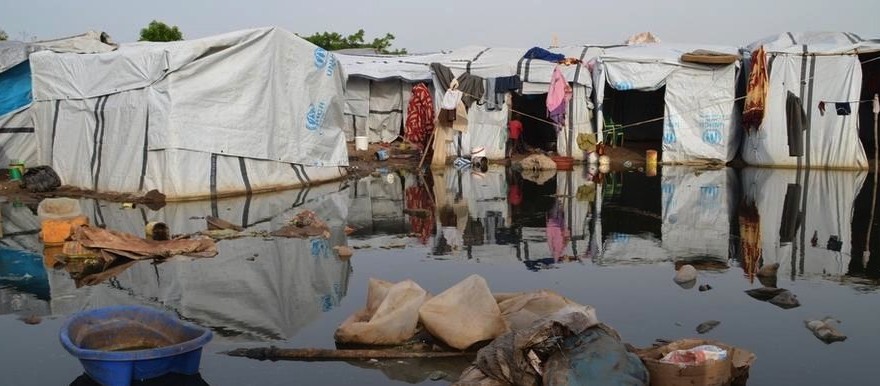About 21,000 people are protected by the United Nations Mission in South Sudan (UNMISS) at its Tongping base in Juba, the capital of South Sudan.
The people living at the base say that there are not enough latrines, their tents have been flooded, and people are suffering from diarrhea, vomiting, malaria and other illnesses.
MSF, a medical aid charity working in the camp, collected stories from the people living at the UN base. Here is what residents of Tomping camp say about their lives and their struggle to survive:
Andrew Kuoc, community leader
“We have already had the first rain and it affected the women, the children. What we need from UNMISS is materials to prepare for the rain. We can maintain everything. What we need from UNMISS is materials.
When it rained a lot of things happened – diarrhea, vomiting… The children got sick. There is also not enough food. The tents are not good enough. We don’t have fuel…
We have water but not enough toilets – they are not enough for us.
Tomping is a flat area so when the rain comes the water flows our way.
When the big rains start we expect diarrhea, malaria, cholera…”
Martha Myadutkuach
“When the rain came everything was flooded, the water came into our tents. We got sick because we were lying on the floor. We got diarrhea and skin problems.
There is no space for our tents. The UN should drain the water and level the floor. They should also bring better tents so that we can stay dry.
The toilets are not enough. The UN should add more toilets so that they are enough for us.”
Mut Jock Koryom
“We don’t have nice water. Our people got sick because of the water. Our children got measles. MSF came here and our children got treatment immediately. That problem is now reduced.
One problem is that we are now getting to the rainy season. Some areas are very flat, there will be floods. We will face many problems, because there will be so much water.
We only received one blanket and one plastic sheet… not enough covering. If rainy season comes, the weather will get colder. Hygiene is difficult.
The toilets – there are too many people, the toilets are really full. And hygiene is very limited. We have people who are moving around the community to talk about hygiene. I have seen places that are dirty. The biggest problem though is the toilets – there are just not enough.
Sometimes the treated drinking water runs out at 3 pm. There are so many of us here.
We received food three times now. The problem in our camp – we don’t have any place to take our sacks to grind the millet. We can make flour of it, but there is no place to make it. Some people go outside of the base to grind their flour, but the security is not good. People have disappeared on the road.”
Reporting by MSF
Photo: Aurelie Baumel/MSF



